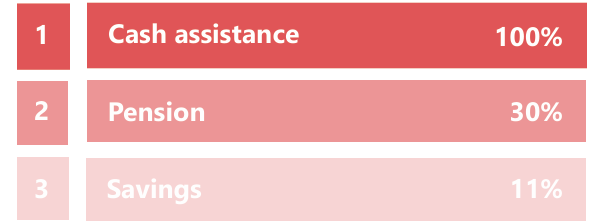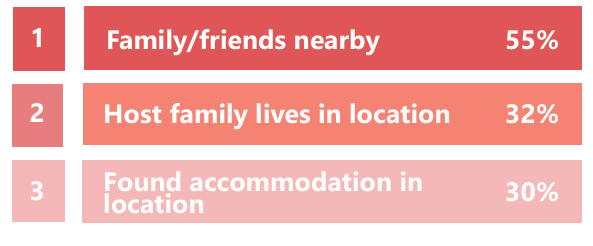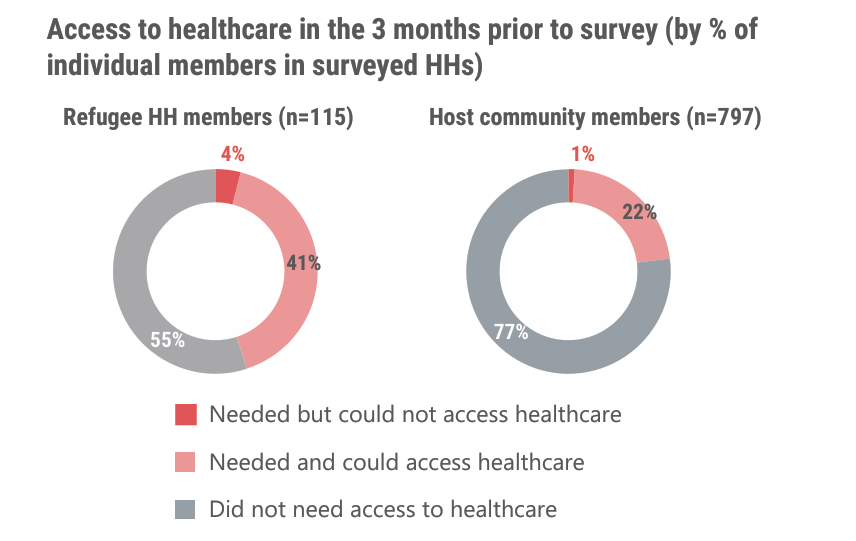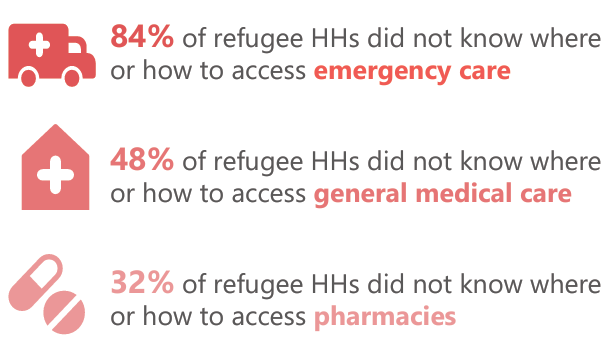REACH Moldova conducted an area-based assessment (ABA) in Anenii Noi in May-June 2023 to identify the primary needs of different demographics in the selected communities, assess the availability and accessibility of essential services, such as healthcare or education, and evaluate social cohesion among refugees and hosts. The assessment found that both refugees and the host community were economically vulnerable, with refugee households highly reliant on humanitarian financial aid. Refugee households further described access to healthcare, financial and food aid as priority needs despite most reporting they had access to such services and aid. Smallholder farmers also faced increased financial difficulties, due to drought and financial factors related to the escalation of the war in Ukraine.
Within the Republic of Moldova, the Anenii Noi region stands out as especially vulnerable to climate related shocks, including droughts and floods. With agriculture accounting for 75% of the land use in Anenii Noi, the population is highly reliant on climate-sensitive livelihoods. In the context of the influx of refugees from Ukraine to the Republic of Moldova caused by the escalation of the conflict on 24 February 2022, REACH, a joint initiative of IMPACT Initiatives, Acted and the United Nations Operational Satellite Applications Programme (UNOSAT), conducted an ABA aimed to provide an in-depth understanding of host communities and refugees residing outside refugee accommodation centres (RACs) in the Anenii Noi raion.
The ABA employed a mixed-methods approach, incorporating both quantitative surveys with refugee and host community households, as well as qualitative semi-structured key-informant interviews (KIIs) with service providers and local authorities, and focus group discussions (FGDs) with both population groups. Data collection took place in the four locations: Anenii Noi city and three rural locations (Bulboaca, Floreni, and Gura Bîcului) between 8 May and 17 June, 2023. Findings should be considered indicative and pertaining only to the assessed settlements.
High rates of economic vulnerability among both refugees and host community
Findings highlight shares of both communities as economically vulnerable: particularly refugee households, with 86% reporting they had no active income. Refugee households indicated that cash assistance from United Nations (UN) agencies, non-governmental organisations (NGOs) or civil society organisations (CSOs) was their main sources of income. Though employment was noted as available by refugees, language and the need for appropriate childcare were cited as significant barriers.

While about a fifth of host community households reported no income, unemployment rates were more than four times higher than the national average for the same age range (20-64 years old).
Social cohesion was rated well, with 84% of refugee households rating the relationship as « good » or « very good » and 48% of host households reporting the same. About half of surveyed host households reported that they agreed that refugees should receive continued support until the conflict ends while 77% also indicated that they felt that Moldova should focus on supporting the local community. Refugee respondents similarly mentioned that an increase in the income of the host community would positively influence dynamics between the two communities.
Smallholder farms suffered financial losses and faced barriers in receiving support
As the region has been experiencing a drought for three years, there have been significant effects on the crop yield, with some farmers experiencing complete losses. Additionally, a shortage of fuel caused by the war, as well as the disruption of the pre-war Ukrainian production and export routes, were indicated to have significantly raised production costs while lowering market prices for both cereals and corn, resulting in selling crops at a loss. Most of the interviewed farmers highlighted the creation of an agricultural cooperative as a main need.
Farmers reported that financial and technical support were available, but with barriers to access, such as being required to use property as a guarantee for a bank loan, potentially subjecting them to increased financial risk.
Payouts and subsidies received similar criticisms. Some were unable to apply for subsidies, as the application cost was too high for them, or that legal requirements changed too often to be able to keep up. Those who did receive subsidies noted that they were insufficient, or damages were not correctly assessed.
Protective measures were reported to have been organised in two of the assessed localities, such as trainings for community members on responses to disaster situations and the correct use of fire, and acquiring specialized equipment or cleaned illegal waste.
Some local authorities also mentioned they had organised replanting campaigns and regularly checked or maintained the quality of water, but some households noted that water was not safe for consumption, citing unpleasant tastes or poor quality.
Housing less of a priority need than food and finances
Economic assistance was strongly noted as a priority need (100%). As most refugee households were highly reliant on aid and lacked an active source of income, planning for the future may potentially explain the high share of reported needs despite high service access. Positively, the most-received types of aid mirror the top reported needs, indicating that the humanitarian response is appropriate in this context: 98% of refugee households reported receiving cash and 75% reported receiving food.

Many refugee households chose their location for social reasons: family or friends lived nearby, offering support. The majority of refugee households (77%) reported no difficulties in finding housing through renting or being hosted. However, despite half of the refugee households being hosted, most host families (74%) indicated they were not receiving assistance for hosting. Perceptions of whether or not host households received support differed between host households and refugee households.
Most of the refugee households interviewed indicated settling in their respective locations for the mid-term: 82% of households reported having resided in the same location for at least 6 months at the time of the survey, and the majority (91%) planned to stay for the following 6 months.
33% of refugee households reported that they planned to apply for asylum/Temporary Protection in order to remain in the territory. This allowed the Temporary Protection holder (either Ukrainian or eligible third-country national) to remain on the territory until and grants access accommodation in temporary placement centres, as well as to primary and emergency healthcare, education for children, and social assistance services. The Temporary Protection status has since been extended to 1 March 2025.
Access to healthcare was among the top reported needs, despite high reported access

Both refugee and host community households reported high access to general healthcare: around 90% refugee households and 97% of host community households reporting access when it was needed. Among the few who could not access the needed medical care, the biggest reported barriers were the lack of specific medicine and the cost of consultations, though distance from medical facilities was discussed in refugee FGDs.
More refugee households reported attempting to access healthcare, though they also had a higher proportion of members over 60 years, who may be more likely to need physical healthcare.
Refugee respondents indicated limited interest in accessing mental health and psychosocial (MHPSS) services. Respondents stated that 9 out of the 10 family members whose emotional state was affecting their daily functioning did not need MHPSS support, and the respondent who described trying to use such services mentioned that it was not financially feasible.
Despite the high reported access, when asked to indicate their top 3 needs, 73% of refugee respondents identified health as a priority need for their households. However, only 34% of refugee households mentioned they needed general medical care and 5% emergency care when asked about specific needed services.

Survey findings also reveal a significant information barrier in knowing how or where to access healthcare such as emergency care or pharmacies. Additionally, no refugee households noted they knew how to access reproductive, maternal or newborn health, or psychological or mental care services. Some of these services may not be available in areas outside of Chişinău.
Overall, refugee and host households described they had a good relationship, but some refugee respondents indicated that financial struggles were a concern for refugee-host relationships. Economic vulnerability was high among both demographics, particularly refugees, who indicated they are highly reliant on humanitarian financial support. Generally, aid for refugee families was appropriate, with needs and aid aligning.